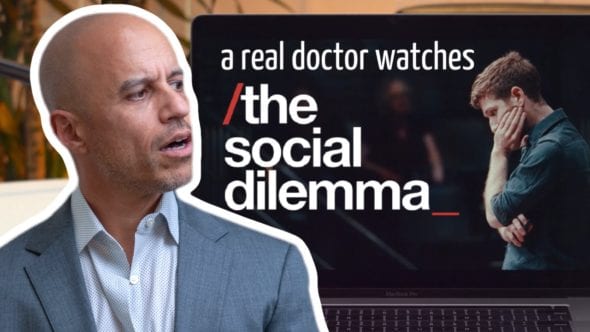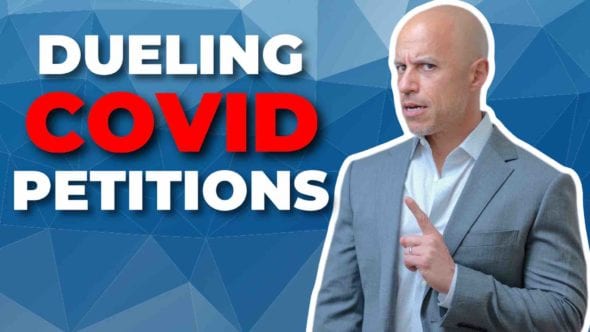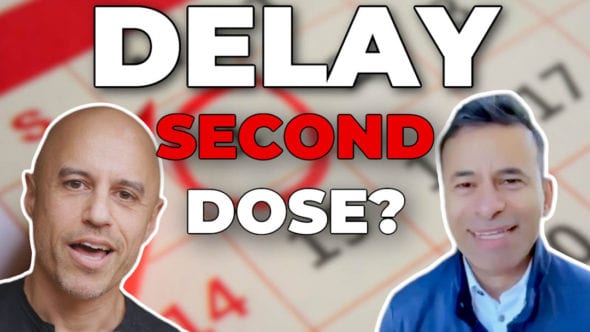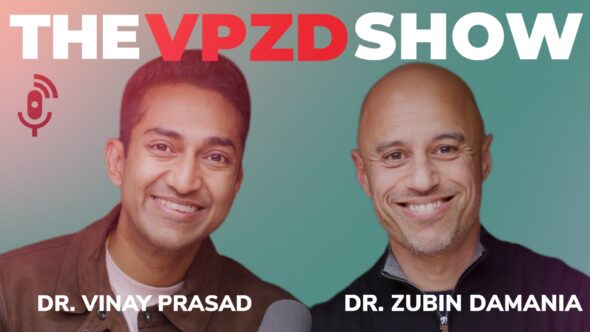Forcing patients to die alone is nothing less than a human rights violation.
Vinay Prasad MD MPH is a practicing hematologist-oncologist and Associate Professor of Medicine at the University of California San Francisco. He studies cancer drugs, health policy, and clinical trials and better decision making. He is author of these academic articles, and the books Ending Medical Reversal(2015), and Malignant(2020). He hosts the oncology podcast Plenary Session, and runs a YouTube Channel VinayPrasadMDMPH. He tweets @VPrasadMDMPH.
Here are all the other episodes we’ve done with Vinay.
Full Transcript Below
Dr. Z: (00:00)
We’re as doctors we’re so risk averse and afraid that we’ve let these private equity companies and these people tell us how to practice medicine to make profit. And I think in COVID what we’re seeing is this, this is kind of coming to a head in how we’re treating our patients at the end of life and saying, well, you can’t have visitors and all of this, but what do you think about this?
Dr. Prasad: (00:17)
Yeah, I recently went on a bit of a tirade online about this topic and you know, I’ll, I’ll read you what I said, and then we can go from there. Oh my gosh. Yeah. So somebody, I saw somebody tweeting some picture of a room, a store room full of iPads on like on like a mobile, a rolly cart. And they say haunting pic of iPads used by loved ones to say goodbye to COVID 19 patients. And my tweet basically said “uh, hard NO. Loved ones should be able to decide if they wish to see loved ones in person before they die. With gown and mask and goggles, inflexible bans are a human rights violation, loved ones can agree to quarantine after seeing a loved one for 10 days PPE shortage is not an issue.
Dr. Prasad: (01:02)
We can agree to assume the risk with a cloth gown, a drape cloth mask. That’s a loved one’s choice how much they value holding their dying father or mother’s hand versus the risk risk of transmission can be mitigated by promise to self quarantine for 10 days by travel alone to the domicile immediately afterwards by disposing of the cloth barriers in the room and changing into different barriers on your way out. I see no justification for any policy does that does not permit a loved one to hold their loved one’s hand as they die. And then I went on basically to say, I don’t know why this is acceptable or has ever been acceptable to anybody. And I, the more I thought about it, how inhumane it is, how awful it would be how inflexible that ban is. The more I realized that it could not possibly be the brainchild of a doctor taking care of patients.
Dr. Prasad: (01:48)
I could never imagine being such an absolute hard liner that I wouldn’t find a way for a son to be able to hug his father one last time, even if that’s through a tablecloth, you know, that we just pull off the table. But something and, and, and the more I thought about it, I felt a strong anger that it is the product of the administrators and how we as doctors allow other people who aren’t doctors to tell us how to be doctors. I think it’s absolutely unacceptable and I wouldn’t allow it.
Dr. Z: (02:17)
You know, there was a picture of a doctor that went viral in the news, he’s, he’s comforting a dying patient, and it’s like “Doctor Comforts Dying Patient” because family can’t be there. That doctor is complicit in the policy that allows that patient to die without their loved one next to them. We’re all complicit because we’re afraid, we’re conditioned to listen to authority. And when the authority is behaving like jackasses, this is, you said, it’s a human rights violation, human rights violation. It’s false imprisonment. You’re saying I’m going to take this person. And you can’t, Oh, here’s an iPad. Right? And, and put it on a stand. And, Oh, here have this conversation. Zoom on the best of days is garbage at the end of your life? You’re going to take that from someone? It’s the one thing that they have there?
Dr. Prasad: (03:02)
I mean, I think it, it, it, it’s, it’s, it’s so awful that we have not spoken up and said that this is absolutely unacceptable. There are things worse than death. I think we’ve forgotten. They’re absolutely much worse than death and loss of who we are as, as human beings is worse than death. Yes. The virus is something to be feared. It is a serious threat and yes, we ought not to take risk for no reason, but there are things worth taking the risk for and to hold your mother or your father’s hand. One last time is clearly in that category. And I think that any doctor who practices, if you were practicing, you know, 50 years ago, and you were in charge of making the policy, you would never make this absolute policy. You would say, look, we’re going to find a way to do this. We’re going to try our best to mitigate the risk, but this person has got to be able to say goodbye. There are so many people who didn’t get the chance to say goodbye to their loved ones. We can’t take that away from people. And to do that out of the sense that you’re doing that for the good of the public health that’s, that’s, that’s a tragedy that’s, that’s being risk averse to the point you’ve forgotten what it means to be human.
Dr. Z: (04:05)
Absolutely. And you know, the worst part of it is then we get angry with the public, for not listening to us. Tsk Tsking them about staying home and wearing masks and social distancing. We get angry. You’re overwhelming our hospitals, you’re doing this and that. All of that’s true, but yet we won’t give them the dignity to be with their loved one at the end of life. And that is on us, like to absolve us of this would be absolutely incorrect. It’s, it’s false imprisonment. It’s a human rights violation. It’s not what we would want. How many, how many of us do you think if one of our loved one was there, we’d get them in that hospital? Of course,
Dr. Prasad: (04:35)
A thousand percent break every rule or take steal some PPE and people would do it. Absolutely. You wouldn’t even have any, you wouldn’t even look, you wouldn’t even feel too bad about it. I not, not for a sec, not for a second, because there are things worse than death. And there are things that you, you go so far, you push people so far and you take away human things and you you’re, you’re, you’re saving something that’s lost it’s meaning the human life is meant to had to have these emotions and to have these reactions. I think it’s, it’s despicable. And, and, and I think the failure is on the medical profession. I mean, we have allowed year after year death by a thousand cuts erosion erosion of the authority in the hospital from us to other people who don’t train as we do, don’t take oathes as we do.
Dr. Prasad: (05:18)
And they tell us what to do. And I don’t allow it. I mean, as a doctor, when I really want something to happen, it’s going to happen, or my foot is going to be up someone’s ass… And, you know, and you can imagine I’m already an annoying personality. You can imagine what my full weight of my anger is on some issue. I will make damn sure it happens. And if this were my patient, I wouldn’t allow it. I would go and bang every drum until this policy is changed. At this point in the pandemic, it’s absolutely not acceptable. I mean, the PPE shortage has been averted whatever was what we can talk about March some other day. But right now I think it’s, it’s just not acceptable. There’s no humanity in this, that’s it? I agree. I couldn’t agree
Dr. Z: (05:58)
More. We need to share this video, tell people to, to agitate if their hospital’s not allowing people to be with people who are dying at the end of life because of some bullshit reason
Dr. Prasad: (06:07)
Got to find a way. I mean, yeah, we can, we can meet in the middle. We can find some, I mean, I’ve rotated at hospitals where they, they, there is a shortage of, of gown and gloves. And so they use cloth gown and gloves and and wash them at high temperatures. I mean, interesting. Yeah. Uthat’s been the case at a couple of veteran’s hospitals that I’ve been at. I mean, there are alternatives. You have to find a way. Ubut the, the absolute hardliner position that nobody can see somebody dying of SARS CoV2 because of a theoretical risk of spread. Uit’s just, it’s too much of a sacrifice. I don’t think it’s right.
Dr. Z: (06:36)
It is. And again, it just destroys even what credibility we have as moral authorities on the pandemic. It goes away when you take that from someone. So I’m with you Vinay. Thanks for sharing this. I hope other people will share this video and we are out.
Related Videos
Category
- The ZDoggMD Show (799)
- Featured Videos (188)
- Doc Vader (142)
- Against Medical Advice (128)
- Medical Humor (95)
- Public Service Announcements (87)
- Music Parodies (74)
- Nurses (59)
- Meditation (38)
- ZVlogg (36)
- The VPZD Show (31)
- ZTalks (28)
- ZBlogg (24)






